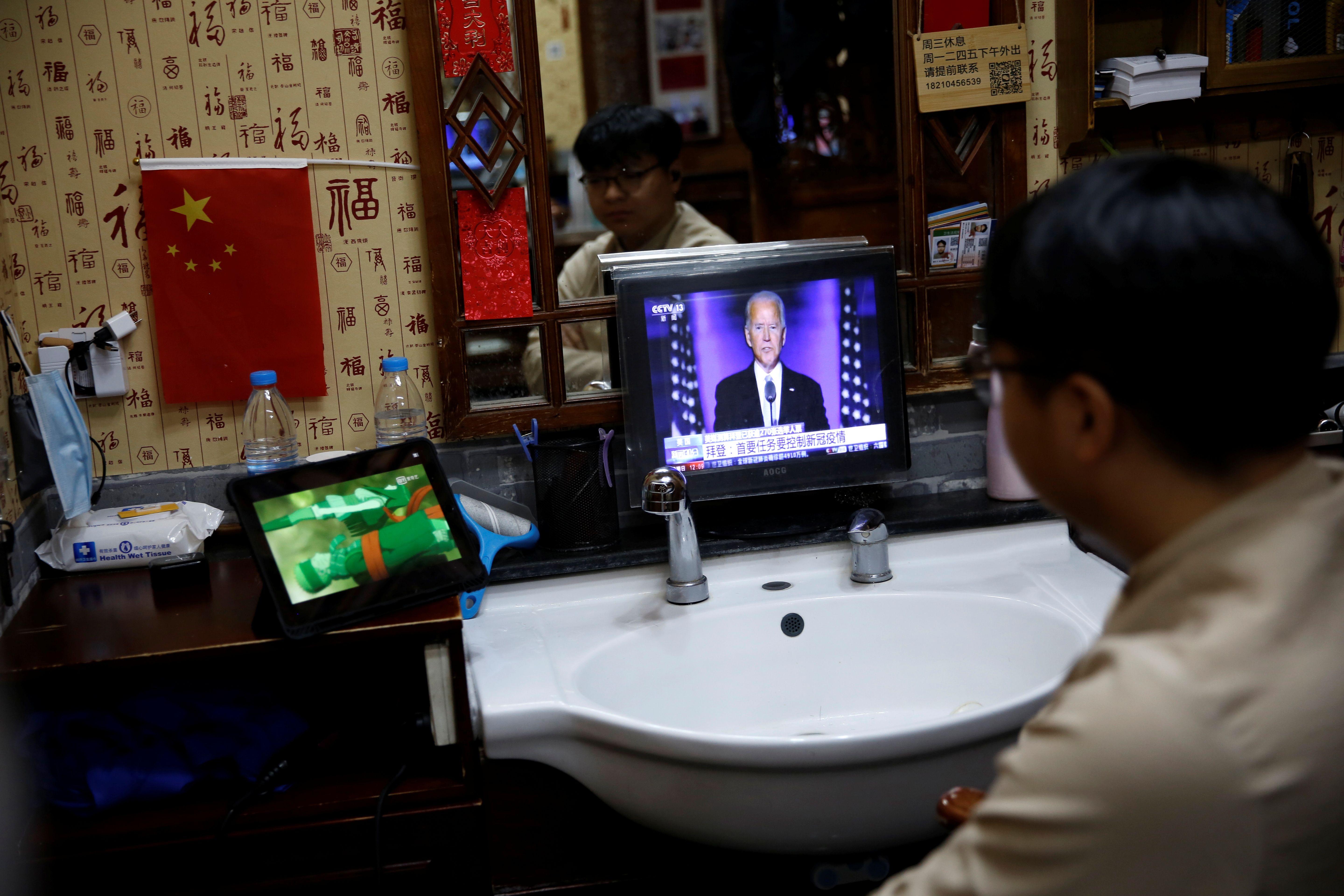The Prospects for Improved U.S.-China Relations under the Biden Administration

U.S.-China relations during Trump’s term were characterised by growing rivalry, which was reflected in the U.S. recognition of China as a strategic rival in 2017. The following year, the U.S. aggravated trade disputes with China, though they had somewhat calmed by January 2020 with the conclusion of the so-called “phase one” agreement. Bilateral relations soon deteriorated again over China’s muddled handling of the COVID-19 pandemic and U.S. accusations that China had concealed information at the outbreak of SARS-CoV-2. This was amplified by criticism of Chinese policy on Hong Kong and towards Uighurs in Xinjiang, and the activities of Chinese technology companies.
Probably Assumptions of Biden’s China Policy
In the election campaign, Biden presented China, which is developing its economic and military potential, as the main rival of the U.S. His administration will maintain a tough position on China, including in the areas of security, technology, and trade. Biden declared that he would fight China’s unfair trade practices (e.g., subsidies or infringements on intellectual property rights) but maintain the “phase one” agreement and duties connected with it at the beginning of his term in office. In addition, it is possible he will continue to limit Chinese companies’ access to U.S. tech, support Taiwan, and maintain activity in the South China Sea. It is likely that the U.S. under Biden will put more emphasis than Trump on the observance of international law and human rights, which means further criticism of China’s actions in Xinjiang and Hong Kong in particular.
However, Biden and his advisers recognise the interdependence of the U.S. and China. The candidate for Secretary of State, Antony Blinken, criticised Trump’s idea of “decoupling” the U.S. from China in the economic sphere as “unrealistic”. The Biden administration will try to use diplomatic means and signal its readiness to cooperate, for example, in climate protection, fighting the pandemic, non-proliferation of nuclear weapons, or WTO reform. This is possible as longs as China’s actions can be effectively verified, for example, by regularly notifying changes in trade policy to the WTO, which it currently does not do.
The biggest change likely will be in perceptions of the role of U.S. allies in the competition with China. Trump antagonised these relations, for example, by imposing tariffs, and preferred unilateral actions, which made it difficult to build a common position towards China. The Biden administration will seek to re-strengthen transatlantic relations and U.S alliances in Indo-Pacific, including traditional allies (Japan, South Korea, Australia) and emerging ones (India or to an extent, also Vietnam). The support of the allies in trade, technology, and other matters is aimed at increasing the U.S. negotiating position in relation to China’s.
Chinese Perspective
China shows readiness to cooperate with the incoming U.S. administration. This is evidenced, for example, by the neutral comments on Biden in the party's daily, the Global Times. The Chinese authorities delayed congratulations to the president-elect, supposedly fearing it could be perceived as interference in internal U.S. affairs and induce Trump to impose sanctions. It was not until 27 November that chairman Xi Jinping sent Biden a congratulatory message and had a brief phone call with him. China hopes to take advantage of the president-elect’s apparent willingness to present a more conciliatory approach to China at the beginning of his term of office. However, this does not mean any Chinese concessions on issues important to the U.S., such as the autonomy of Hong Kong or illegal sourcing of technology by Chinese firms.
The Chinese authorities predict that tensions in bilateral relations will persist during Biden's tenure. Therefore, they are focused on developing China’s potential to reduce its dependence on cooperation with the U.S. and limit the effects of sanctions. Increasing technological self-sufficiency, including in the field of artificial intelligence and semiconductor production, is to be part of the new five-year plan and China’s development strategy until 2035. Technological advantages and strengthening trade contacts with Asian countries, including through the RCEP agreement signed in November this year, increase China’s influence in the region at the expense of the U.S. China expects Biden to seek to strengthen the U.S. economic presence in Indo-Pacific, for example, by joining the CPTPP trade agreement. The recent declarations of China’s possible accession to this agreement, although unrealistic due to its regulatory requirements, are intended to create the impression of a dominant Chinese position in the region.
Conclusions and Perspectives
The Biden administration will maintain a firm policy towards China, among others, in the technological sphere, and will react decisively to its aggressive actions by, for example, imposing sanctions (possibly in coordination with allies). This approach has cross-party support in Congress and amongst the public (over 70% of Americans have a negative opinion of China). However, the Biden administration will use a wider range of instruments, including diplomatic ones. A possible Xi-Biden meeting at the beginning of the new American president’s term is possible, as are the development of communication channels to prevent escalation of tensions, for example, in the South China Sea. U.S.-China relations will probably be more predictable than during Trump’s term, which will enable cooperation on global issues, such as climate or the pandemic (the Biden administration will rather avoid the offensive term Trump frequently used: “China virus”). The U.S. may also make a gesture of goodwill towards China, for example, by resuming Fulbright scholarships for Chinese citizens. For Biden, the recovery of the U.S. economy after the pandemic and strengthening American soft power, including the role of the United States as the leader of global democracies, will be important parts of the competition with China.
The actions of the Biden administration will be a greater challenge for China than the Trump presidency due to the likely improvement in U.S. relations with its allies. Biden’s probable approach to China, combining rivalry with cooperation, will give U.S. allies greater avenues to develop relations with both powers. This will be especially important for Asian countries closely connected to the Chinese economy. Their participation in the RCEP showed the weakness of the U.S. efforts to isolate its rival. China will not only try to discourage individual countries from cooperating with the United States but also continue to build a counterbalance to the U.S. and related democracies, for example, by tightening relations with Russia or Central Asian states. This cooperation would be based on authoritarian political models and economic projects, including telecommunications (5G networks), infrastructure within the Belt and Road Initiative (BRI), and for as long as the pandemic continues, also medical support from China. This may lead to a partial “decoupling” of China from the U.S. and its allies, for example, in technology.
The expected long-term increase in pressure on China in terms of human rights and other areas will entail a more confrontational attitude towards the U.S. and its partners (for example, the sanctions imposed on Australia this year in part for calling for a WHO investigation into the outbreak of the pandemic). Also possible are further provocations against Taiwan or countries in the South China Sea. China will also use its activity in international organisations, including the United Nations and WHO, to increase its influence.
The EU, through closer cooperation with the U.S., including in their dialogue on China that started in October, will seek to strengthen its position vis-à-vis the latter, including on economic matters. Similar perceptions on such issues as climate change, the importance of the WTO, and commitment to human rights and international law will contribute to more effective EU-U.S. cooperation than during Trump’s tenure. In its contacts with the EU, China will point to the instrumental nature of the American intentions to strengthen transatlantic relations. For this purpose, economic issues will continue to be used, in particular the efforts to conclude an investment agreement (important, for example, to the economic interests of Germany), but without major concessions from the Chinese side. China treats the EU’s assertive approach to it as a permanent element of Europe’s policy, so China will focus instead on developing bilateral contacts, for example, with Germany, Spain, or Hungary. It is in Poland’s interest to support the shaping of a common EU-U.S. position towards China, which will serve its commercial and other interests and the maintenance of a global order based on international law.



